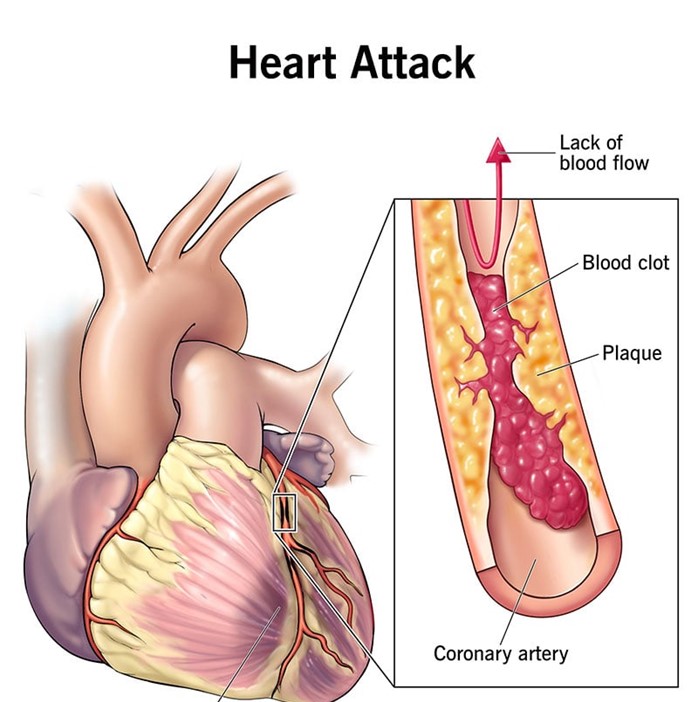A 46-year-old male client who had a myocardial infarction (MI) 24 hours ago comes to the nurse's station fully dressed and wanting to go home. He tells the nurse that he is feeling much better at this time. Based on this behavior, which client problem should the nurse include in the plan of care?
Ineffective coping related to denial
Emotional conflict due to stress
Deficient knowledge of MI lifestyle changes
Anxiety related to treatment plan
The Correct Answer is A
Choice B reason: Emotional conflict due to stress is not a specific problem for a client who had an MI 24 hours ago and wants to go home despite his condition. Emotional conflict is a state of having mixed or contradictory feelings about something or someone, such as family, work, or self. Stress is a response to any physical, psychological, or environmental demand that exceeds one's coping resources. The nurse should assess the client's sources of stress and conflict and help him manage them.
Choice C reason: Deficient knowledge of MI lifestyle changes is not a primary problem for a client who had an MI 24 hours ago and wants to go home despite his condition. Deficient knowledge is a state of lacking information or understanding about something, such as disease process, treatment options, or self-care measures. Lifestyle changes are modifications in one's habits or behaviors that promote health and well-being, such as diet, exercise, smoking cessation, or stress management. The nurse should assess the client's learning needs and readiness and provide appropriate education.
Choice D reason: Anxiety related to treatment plan is not an evident problem for a client who had an MI 24 hours ago and wants to go home despite his condition. Anxiety is a feeling of apprehension, worry, or fear that interferes with one's normal functioning or well-being. Treatment plan is a set of goals, interventions, and outcomes that guide the care of a client with a specific health problem, such as MI. The nurse should assess the client's level of anxiety and provide information and reassurance about his treatment plan.

Nursing Test Bank
Naxlex Comprehensive Predictor Exams
Related Questions
Correct Answer is B
Explanation
Choice A: A 14-year-old client with anorexia nervosa refusing to eat the evening snack is a concern, but it’s not an immediate threat. The nurse can address this issue after dealing with more urgent situations.
Choice B: An 18-year-old client with antisocial behavior being yelled at by other clients requires immediate attention. This situation can escalate quickly and may lead to physical harm or emotional distress for the client.
Choice C: A 16-year-old client diagnosed with major depression refusing to participate in group is a concern, but it’s not an immediate threat. The nurse can address this issue after dealing with more urgent situations.
Choice D: A 17-year-old client diagnosed with bipolar disorder pacing around the lobby might be experiencing agitation or restlessness, but unless they’re showing signs of immediate distress or posing a risk to themselves or others, it’s not the most urgent situation.
Correct Answer is A
Explanation
The correct answer is A. Flushed, peeling skin
Choice A reason: Flushed, peeling skin is a classic sign of scarlet fever, which is a condition that can arise from Streptococcal pharyngitis. Scarlet fever is characterized by a red rash that can cover most of the body and may lead to the skin peeling. This symptom is a direct reaction to the toxins produced by the Streptococcal bacteria.
Choice B reason: Red bumps across the chest could be indicative of many conditions and are not specifically characteristic of the reaction to toxins produced by Streptococcal bacteria. While a rash is common in scarlet fever, it typically starts on the face or neck and spreads to the rest of the body, rather than presenting as isolated red bumps.
Choice C reason: A white coating on the tongue, often referred to as “strawberry tongue,” is indeed associated with scarlet fever. However, it is not the clearest indication of a reaction to the toxins. The white coating usually precedes the strawberry-like appearance, where the tongue becomes red and bumpy.
Choice D reason: While a high fever is a symptom of scarlet fever, it is not specific to the reaction to toxins from Streptococcal bacteria, as many infections can cause high fevers. The term “protracted” suggests a prolonged fever, which could be seen in various conditions.
Whether you are a student looking to ace your exams or a practicing nurse seeking to enhance your expertise , our nursing education contents will empower you with the confidence and competence to make a difference in the lives of patients and become a respected leader in the healthcare field.
Visit Naxlex, invest in your future and unlock endless possibilities with our unparalleled nursing education contents today
Report Wrong Answer on the Current Question
Do you disagree with the answer? If yes, what is your expected answer? Explain.
Kindly be descriptive with the issue you are facing.
